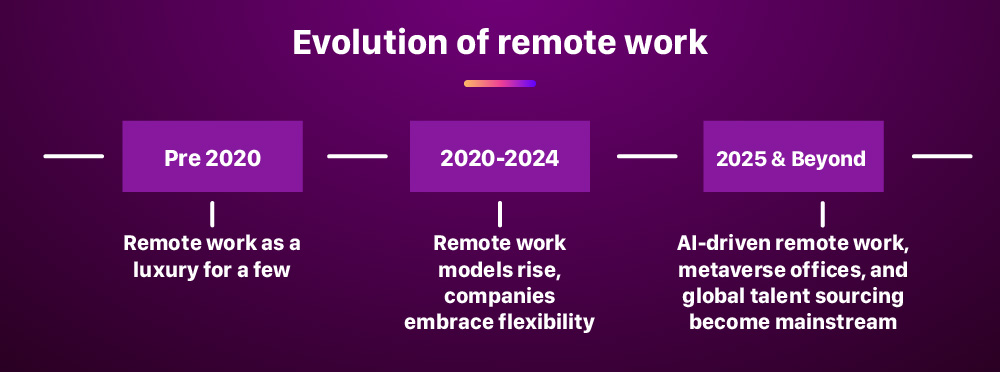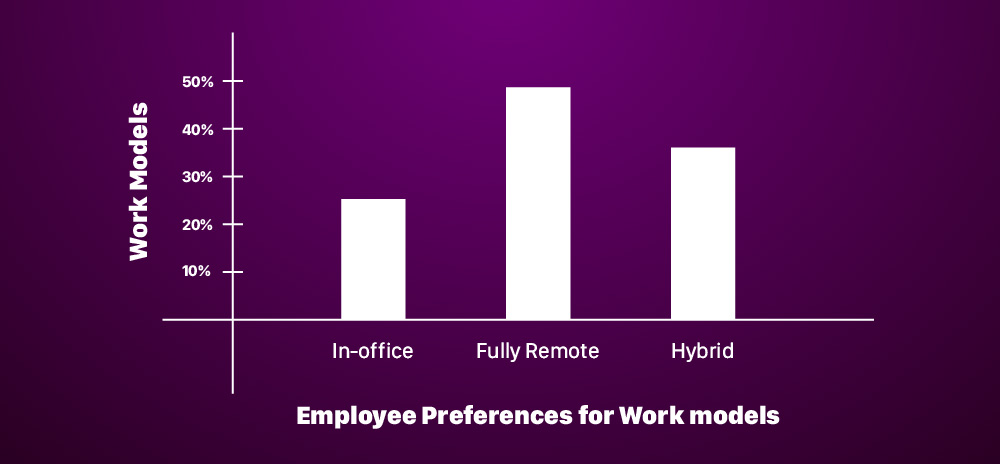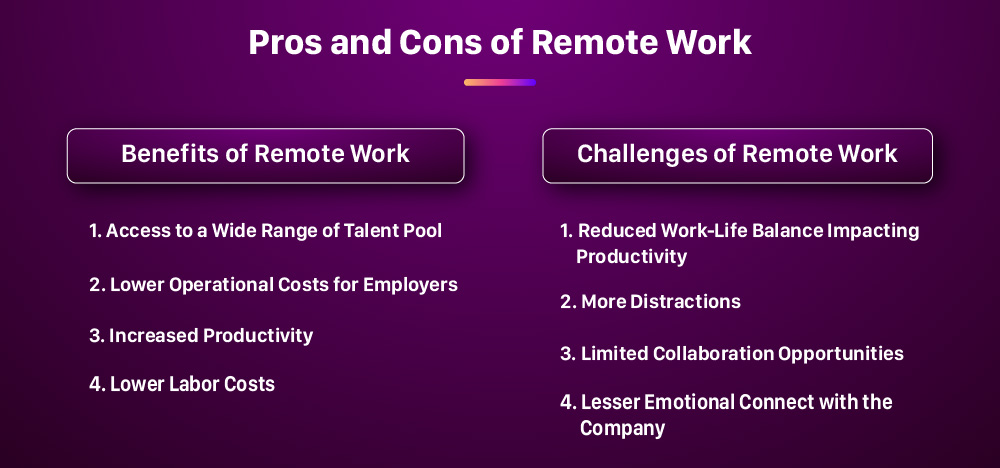Summary
Remote work has evolved a lot since 2020. And in the present day, it’s much more than just scheduling Zoom calls. Businesses are leveraging technology as much as possible to revolutionize remote work. They are also focussing on employee well-being more than anything.
The remote work trend isn’t a voguish trend anymore. It’s a seismic shift in the paradigm of working. Once an occasional perk, it has found itself on the winding road of business operations all over the globe now. Fast-forwarding to the present day, employees are no longer bound inside four walls of an office.
They are enjoying the liberty of choosing their workspace from classic sunny balconies to all-cozy home offices. The remote work trends are changing at a pace faster than ever. Companies are modifying their policies and redefining their workplace culture. Remote work is more than a hype now. It’s an actual change that is upon us, the young workforce.
So without any further ado, let’s get into the latest findings and emerging trends of a remote workforce. Let’s also assess the future of remote work. We’ll further talk about how companies can keep ahead of their competitors in this rapidly progressing culture.
Current Landscape of Remote Work: Key Stats and Insights
Employees across the globe are making their preferences loud and clear about remote work. Now, I’m not just stating facts. Here’s an array of numbers put together for your reference.
Remote Work Preferences
A flattering 73% of global employees want flexible work options (Source: Microsoft Work Trend Index). And, this demand is conditioned to their stay in an organization. To add more, an overwhelming 98% say they’d like to work remotely at least part-time. Says Buffer. Are companies listening and catering to their demands? They definitely are! That is why remote work models are becoming the sweet spot. A Gallup study says, 53% of companies are now offering a flexible work model. Going by numbers, work is no longer a place, it’s a state of mind. And, numbers don’t lie.
Remote Work Demography
Here’s something interesting. Millennials and Gen Z are basically owning the remote work universe. And that’s quite predictable! After all, they make up 68% of the workforce. But wait, it’s not just the young guns, senior executives are hopping on the remote bandwagon too.
This demographic category has grown by 34% in the last three years when it comes to remote work. And here’s the truth, women are 22% more likely than men to prefer remote work. Maybe they’ve cracked the secret to the elusive work-life balance. Or maybe it’s just the appeal of working in pajamas. Who’s to say?
We have curated an exhaustive resource on remote work for you!
Remote Work Industries
Now I’ll come to my favorite part about remote work at present! It’s not just the tech geeks hiding behind their screens and enjoying the flavor of remote work. Remote work can be and is a thing for every industry today. Industries like IT (85%), marketing (74%), and customer service (64%) are leading the charge, of course. However, healthcare and education are catching up fast.
Telehealth appointments have been up by 63% for a few years now. Speak about the finance and law sectors. They are well known for their old-school ways. Even they are dipping their toes into the remote pool. Who knows? Soon, you might get legal advice sitting in your living room!
Productivity Insights
Did you know that 77% of employees get more done than when they’re stuck in an office? Pretty surprising, right? And it gets better. Companies with remote teams have 25% lower employee turnover (Source: PR Newswire). People seem to stick around when they get to work from home!
Plus, remote workers clock in an extra 1.4 days a month compared to their office-bound counterparts. Sure, the office grind has its perks. But it looks like the work-from-home life is winning in terms of productivity. The couch turned out to be a productivity powerhouse.
Global Adoption Rates
Here’s a fun little stat: 35% of the US workforce are working remote completely. This includes full-time and part-time employees. And this certain target is not just one country, or even one continent so to speak. Influential nations across the globe like Germany, the UK, and Canada are a part of this.
Remote job postings are on a soar by 40% since 2022. Talk about a global shift! By 2025, a mammoth 32.6 million Americans will consider the home office their new normal. That’s a piece of good news for the local broadband companies!

10 Top Remote Work Trends for 2025: What to Expect?
In this section, we’ll read about what changes in trends are waiting for remote work. Now don’t think you’re on the backfoot because there’s more change. It’s actually for your own good and aligns with your business goals more than you think! The remote work trends and remote work statistics of 2025 are coming right up!
Advanced Collaboration Technologies
- AI-powered virtual assistants, VR meetings, and digital whiteboards are enhancing remote teamwork.
- Video conferencing tools like Zoom, Microsoft Teams, and Slack will continue to integrate AI-driven automation.
Learn more about remote team collaboration here
Distributed Workforces and Global Talent Sourcing
- Companies will increasingly hire talent from different countries to access diverse skill sets.
- Most of the hiring managers globally believe remote work helps them dip into better candidate resources.
Focus on Employee Well-being and Mental Health
- Employees worldwide are prioritizing mental health benefits when choosing a job. Even employers are keeping this as a focus point while onboarding new talent.
- More companies will offer virtual wellness programs, mental health days, and flexible schedules.
Learn more about effective and engaging employee onboarding process through this blog.
Reskilling and Upskilling for Remote Work
- The tech revolution has mandated the reskilling of employees with different tools and software. This trend will further surge in 2025.
- Digital training programs, virtual workshops, and online certifications will come into the main frame.
Emphasis on Cybersecurity and Data Protection
- One of the few drawbacks of remote work is rising cyber threats and security breaches.
- Companies have suffered and learned enough in the past 5 years. They will now take extra measures and invest more in VPNs, multi-factor authentication, and encrypted communication tools.
Performance Measurement Evolution
- Traditional KPIs are being replaced by output-based performance tracking.
- AI-driven tools will help managers assess employee engagement, productivity, and work quality remotely.
Sustainable Remote Work Practices
- Companies will adopt carbon-neutral remote work policies.
- Using green tech, reducing digital waste, and limiting unnecessary virtual meetings will gain momentum.
More Work Flexibility among Employees
- Asynchronous work will rise. Teams will work in different time zones without real-time meetings.
- Employees will have more control over work hours and deliverables.
Teamwork Gets More Immersive
- Virtual Reality (VR) and Augmented Reality (AR) will enhance team interactions.
- Metaverse workplaces may become mainstream for remote teams.
New Approaches to Management Practices
- Remote leadership will shift to trust-based, outcome-driven models.
- Managers will focus on employee autonomy, engagement, and well-being.

How Can Businesses Prepare for Remote Work in 2025?
Now that you are aware of what’s coming next, I believe it will be much easier for you to plan ahead. And I have created this section to give you that extra push. Let’s look at what should be your key priorities to adapt to the upcoming trends.
Establish Clear Objectives and Communication Channels
Define KPIs, expectations, and structured communication channels. Try implementing weekly check-ins and transparent work processes within your teams.
Invest in Advanced Remote Tools
Adopt AI-driven project management tools (Trello, Asana, Notion) to organize tasks better. Normalize the execution of time-tracking software and automated HR systems.
Enhance Security Practices
Implement zero-trust security models and advanced encryption methods. Further, educate your employees about phishing attacks and safe remote work practices.
Prioritize Reskilling and Upskilling
Offer continuous learning platforms and professional development courses. Encourage certifications in AI, data security, and remote team leadership.
Focus on Employee Engagement and Retention
Virtual team-building activities, online social events, and recognition programs should be the mission for your HR teams. A common observation: companies that invest in engagement see much lower absenteeism.
At this point, you are well aware of the current remote work trends and the remote work statistics of 2025. You also know the areas of action. So are you excited for the future of remote work?
Pros and Cons of Remote Work
Considering all the pointers mentioned above you may still want to tally the plus and minus pointers of remote work. If that’s the case, this section is for you.
Benefits of Remote Work
Let’s start with the good things first.
- Access to a Wide Range of Talent Pool: Remote hiring allows companies to access talent worldwide without geographic limitations.
- Lower Operational Costs for Employers: Businesses save up to $11,000 per employee annually on office space and utilities.
- Increased Productivity: Studies show remote employees work 1.4 days more per month than office workers.
- Lower Labor Costs: Companies hiring remotely save 20-30% on salaries compared to in-office teams.
Challenges of Remote Work
To quote Dance Gavin Dance, “All great things have battle scars”. And so does remote work. With a heavy heart, let’s have a look at the remote work challenges.
- Reduced Work-Life Balance Impacting Productivity: Employees often struggle to separate work from personal life. This leads to burnout.
- More Distractions: Home environments aren’t always ideal for focused work. This can highly impact efficiency.
- Limited Collaboration Opportunities: In-person brainstorming and spontaneous discussions are harder in remote setups.
- Lesser Emotional Connect with the Company: Lack of face-to-face interactions can reduce employee engagement and loyalty.

Revolutionize Your Remote Work Strategy with Remunance Employer of Record Solutions
Okay, there’s more to a remote workforce than just sending emails and scheduling Zoom calls. It requires structured hiring and an effective onboarding process. Leave alone the payroll management and compliance support! Your HR team also has to formulate engagement strategies for the newly onboarded team. Welcome to the Remunance world!
With global clients spanning 20+ countries, we provide end-to-end employer of record (EOR) services. We ensure that the hiring of your remote team is effortless and convenient. We take care of the employee payroll process and their respective tax liabilities. We also have our dedicated team to arrange for different types of employee engagement activities.
To cater to the remote work trends of 2025 further, we have built a solid IT infrastructure and data security for the EOR employees. Our two-business-day response time ensures fast, reliable support. At Remunance, we ensure your team is well-supported and is thriving in the remote work setup.
Conclusion
The road ahead for remote work you ask? Well, we’re in an era where “You’re on mute” is practically a universal greeting. So, I better compare it with the Wi-Fi in our homes. Sometimes spotty but constantly evolving and is here to stay. With AI and global hiring, talent isn’t confined to office cubicles. It’s going leaps and bounds to enable cultural mix within organizations. Hence, businesses have two choices now, adapt or lag behind.
So, what’s your next move? What are the further remote work predictions? Will you upgrade your remote work trends or keep buffering? My advice? Stay curious about the current scenario and remote work statistics 2025. Embrace this workplace revolution and the future of remote work. Also, remember one thing, success favors those who hit “refresh” before things go stale!
About Remunance
Remunance is an Employer of Record (EOR) services provider in India, helping global companies hire, manage, and support full-time employees without setting up a local entity. We take care of HR, payroll, compliance, and benefits so businesses can focus on growth while building their teams in India with confidence.
Remunance enables businesses from UK, Australia, Canada, France, US, and the Middle East to recruit, hire, and manage workforce and benefits in India.
FAQs
What are the current trends regarding remote working?
This is a trend that has moved from a temporary pandemic solution to an almost permanent part of the company’s future working practice. As the new notation in the work environment, corporations will now hire people from anywhere if they are providing high-class digital collaboration tools, embracing hybrid models, and becoming more employee welfare-focused on flexibility and performance instead of physical presence
What is going to be the future of remote working?
Now it will be customized efficiency-oriented-meeting using virtual reality (VR), the future of making AI-enabled productivity tools, and asynchronous working modes as the practice-precedent. Companies, while redefining work-life balance, may mostly observe the remote-first policy in fields that do not need everybody physically present.
Will remote work be gone or is here to stay forever?
Remote work is not disappearing but growing. Some companies bring the staff back to the offices, but many also choose a hybrid model. Every fully remote position is still available with tech, consulting, and digital industries. The ability to adapt is the key, and companies will set priorities between remote flexibility and in-person collaboration.
What would you say are the biggest challenges of remote work today?
Remote work provides freedom but comes with communication gap challenges, no bonding within teams, and the possibility of burnout. Companies improve digital infrastructure, nurture cultural virtual teams, and ensure proper boundaries between personal and professional lives for employees to deal with these issues
Which industries are the most future-proof by remote working?
The tech and finance industries, coupled with marketing and creative, are likely going to be the most remote industries. AI, cybersecurity, and, increasingly, data analytics jobs will also become more gainfully remote. Even the more traditional office-local-situated roles, like HR and legal consulting, are beginning to embrace flexible working arrangements.




